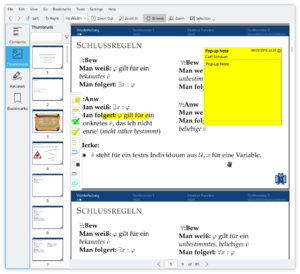Okular/ru: Difference between revisions
Updating to match new version of source page |
Updating to match new version of source page |
||
| Line 13: | Line 13: | ||
Эта разработка начата как часть программы Google's Summer of Code. Описание проекта можно найти в [http://developer.kde.org/summerofcode/okular.html Уголке Разработчика KDE]. | Эта разработка начата как часть программы Google's Summer of Code. Описание проекта можно найти в [http://developer.kde.org/summerofcode/okular.html Уголке Разработчика KDE]. | ||
Okular | '''Okular''' combines the excellent functionalities of [[Special:myLanguage/KPDF|KPDF]] with the versatility of supporting different kinds of documents, like PDF, Postscript, DjVu, CHM, and others. | ||
[http://okular.kde.org/formats.php Страница обработчиков формата документа] содержит схему, описывающую более подробно форматы, и функций, поддерживаемые в каждом из них. | [http://okular.kde.org/formats.php Страница обработчиков формата документа] содержит схему, описывающую более подробно форматы, и функций, поддерживаемые в каждом из них. | ||
[[Image:Okular-annotations.png|thumb|300px|center| | [[Image:Okular-annotations.png|thumb|300px|center|Annotations in Okular, which can be saved within the PDF file]] | ||
| Line 40: | Line 40: | ||
How to keep the annotations you made to the PDF file: | How to keep the annotations you made to the PDF file: | ||
By default, Okular saves annotations in the local data directory for each user. Since KDE 4.9, it's optionally possible to store them directly in a PDF file by choosing | By default, '''Okular''' saves annotations in the local data directory for each user. Since KDE 4.9, it's optionally possible to store them directly in a PDF file by choosing <menuchoice>File -> Save As...</menuchoice>, so they can be seen in other PDF viewers. | ||
Note that this feature requires Poppler 0.20 or newer for regular PDF documents. If the PDF document you are annotating is encrypted, this feature requires Poppler 0.22 or newer. | Note that this feature requires Poppler 0.20 or newer for regular PDF documents. If the PDF document you are annotating is encrypted, this feature requires Poppler 0.22 or newer. | ||
[[Category:Графика/ru]] | [[Category:Графика/ru]] | ||
Revision as of 16:40, 21 July 2018
Что такое Okular?
 |
Okular это универсальный просмотрщик документов для KDE SC 4.x |
Вы можете следить за развитием проекта на его домашней странице.
Создание
Эта разработка начата как часть программы Google's Summer of Code. Описание проекта можно найти в Уголке Разработчика KDE.
Okular combines the excellent functionalities of KPDF with the versatility of supporting different kinds of documents, like PDF, Postscript, DjVu, CHM, and others.
Страница обработчиков формата документа содержит схему, описывающую более подробно форматы, и функций, поддерживаемые в каждом из них.

Наряду с поддержкой многих форматов, Okular предлагает такие функции, как выделение текста, аннотации, извлечение файлов, встроенных в документы, и много других сюрпризов. Скриншоты Okular в действии можно увидеть здесь.
Вы можете поговорить с разработчиками и другими пользователями в IRC, irc.freenode.org, канал #okular.
If you are interested in contributing to Okular, please contact the team. Programmers and non-coders are welcome all the same.
Советы и рекоммендации
Печать
В этой теме форума пользователь заявил, что Okular не смог напечатать PDF-файлы. Проблемой послужил некорректный ~/.cups/lpoptions. Переименование этого файла разрешает Okular восстановить его, после чего у него уже нет проблем с печатью PDF-документов.
Reviewing Documents / Annotations
Двойной клик на любом из инструментов Рецензирование (F6) позволяет сделать несколько аннотаций без активации инструмента после первого раза.
How to keep the annotations you made to the PDF file:
By default, Okular saves annotations in the local data directory for each user. Since KDE 4.9, it's optionally possible to store them directly in a PDF file by choosing , so they can be seen in other PDF viewers. Note that this feature requires Poppler 0.20 or newer for regular PDF documents. If the PDF document you are annotating is encrypted, this feature requires Poppler 0.22 or newer.
